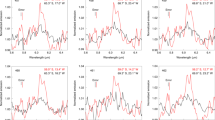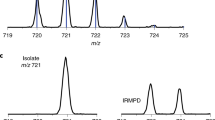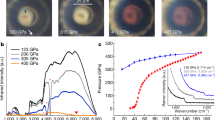Abstract
IN a recent article1 describing results obtained with the coudé spectrograph of the Mount Wilson Observatory, W. S. Adams gives some details of the identification of a number of interstellar lines with absorption ; lines of various molecules in their lowest possible energy states. Among others he mentions a line at? 3934.3 provisionally assigned to NaH by McKellar2.
This is a preview of subscription content, access via your institution
Access options
Subscribe to this journal
Receive 51 print issues and online access
$199.00 per year
only $3.90 per issue
Buy this article
- Purchase on Springer Link
- Instant access to full article PDF
Prices may be subject to local taxes which are calculated during checkout
Similar content being viewed by others
References
Adams, W. S., Astrophys. J., 93, 11 (1941).
McKellar, A., Pub. Ast. Soc. Pac., 52, 187 (1940).
Gaydon, A. G., and Pearse, R. W. B., Proc. Roy. Soc., A, 173, 37 (1939).
Hori, T., Z. Phys., 62, 352 (1930).
Author information
Authors and Affiliations
Rights and permissions
About this article
Cite this article
PANKHURST, R., PEARSE, R. Molecular Sodium Hydride in Interstellar Space. Nature 149, 612–613 (1942). https://doi.org/10.1038/149612c0
Issue Date:
DOI: https://doi.org/10.1038/149612c0
Comments
By submitting a comment you agree to abide by our Terms and Community Guidelines. If you find something abusive or that does not comply with our terms or guidelines please flag it as inappropriate.



